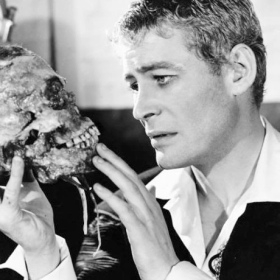Obituary: Peter O’Toole was the genuine article

One of the few great glamorous stars of post-war British stage and screen died in the Wellington Hospital, London, on Saturday night. Peter O’Toole was 81 and had been ill for some time, sadly missed at the recent National Theatre 50th birthday celebration gala; his Hamlet opened the theatre at the Old Vic in 1963.
O’Toole’s year group at RADA in 1953 included Albert Finney, Alan Bates and Richard Harris, and there would be a way of documenting the seismic shifts in our performance culture through their accumulative careers.
In 1957 Kenneth Tynan wrote about “such promising debutants” as Peter O’Toole of the Bristol Old Vic (he played his first Hamlet there, aged 24) and Albert Finney of the Birmingham Rep. They both went on to stardom, but they carried the theatre and its writers and directors with them, and not simply because O’Toole broke the world record for the speed with which he consumed a yard of ale in the Dirty Duck in Stratford-upon-Avon.
O’Toole, like Harris, was blatantly Irish, and a great sportsman; Bates and Finney, sons of the northern working class British soil. Their collective personalities defined everything that changed after Look Back In Anger in 1956: O’Toole was a disaffected, cynical soldier in the Malayan jungle wars in Keith Waterhouse and Willis Hall’s The Long and the Short and the Tall (1958), just as influential a play as the Osborne.
Before he had the retroussé nose job for his great career-defining performance as Lawrence of Arabia in 1962, he had set Stratford-upon-Avon alight as both Petruchio (opposite Peggy Ashcroft) and Shylock. Richard Burton, a similar shooting star said this:
“He looked like a beautiful, emaciated secretary bird… his voice had a crack like a whip… most important of all you couldn’t take your eyes off him… acting is usually regarded as a craft and I claim it to be nothing more except in the hands of the odd few men and women who, once or twice in a lifetime, elevate it into something odd and mystical and deeply disturbing. I believe Peter O’Toole to have this strange quality.”
Stardom is quicker and cheaper these days. O’Toole was the genuine article, and he had an unquantifiable sex appeal, even when he flopped disastrously as Macbeth at the Old Vic in 1980 (a production with so much gentility and blood slurping around it became known as “Kensington Gore”); the show was a sell-out despite the reviews, and O’Toole went on in that same decade to give magnificent stage performances in Bernard Shaw classics – as Jack Tanner in Man and Superman, Higgins in Pygmalion and King Magnus in The Apple Cart.
But it was as his friend and fellow denizen of Soho, Jeffrey Bernard, that O’Toole probably enjoyed his greatest theatrical success, when he played the old boozy bugger in Ned Sherrin’s production of Jeffrey Bernard is Unwell, scripted by Keith Waterhouse, in 1989. He was funny, waspish, melancholic, fruity, impossible and irresistible all at once; Bernard used to turn up at the theatre most nights just to check out how appealing he could be (he wasn’t).
O’Toole was married for 20 years to Sian Phillips, currently working in Washington, and they had two daughters together, one of whom, Kate O’Toole, is a well-known and highly accomplished Dublin actress. His son Lorcan, with his second wife, Karen Brown, was a keen cricketer in his younger days; I recall ferrying my own son to and from the Cricklewood Cricket Club in the 1990s where O’Toole was an unwavering, dedicated MCC-qualified junior coach.
A few weeks ago I saw a re-run on television of the film of Becket in which he starred opposite Burton. I don’t think there is any acting on screen that is finer, grainier, or more perfectly tuned. And how wonderful that he ended with such a delightful movie as Roger Michell’s Venus (2006), a story about a small-time, dying actor and a feisty but susceptible young woman (played gorgeously by Jodie Whittaker), scripted by Hanif Kureishi.
As film historian David Thomson says in his Guardian obituary, it was as touching as anything O'Toole had ever done, and he received an eighth Oscar nomination; he never actually won the Oscar but was awarded an “honorary” statue in 2003. His favourite play was Waiting for Godot, in which he appeared at the Abbey in Dublin in 1969, with his great friend Donal McCann.
He turned down a knighthood “for personal and political reasons” in 1987. He was not only a great talker and socialiser, but also a truly wonderful writer, his memoir Loitering with Intent (1992) drawing on childhood memories and his early days in the Navy, on National Service, and as a cub reporter in Leeds, Yorkshire, where his family had moved when he was very small.










